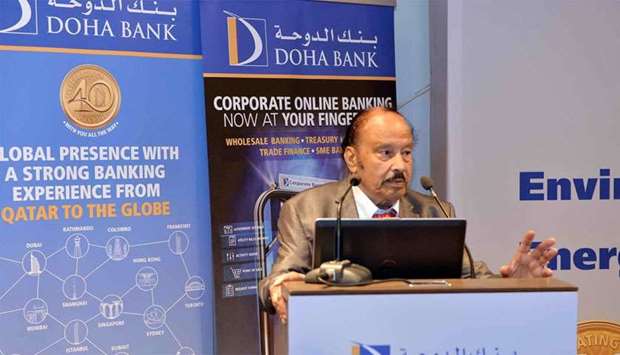*J L Kellogg distinguished professor at Northwestern University, US, Dr Bala V Balachandran, speaks at Doha Bank's knowledge sharing session
Doha Bank hosted a knowledge sharing session on “Strategic customer profitability through customer centricity” on Saturday.
The event was attended by Dr Bala V Balachandran, J L Kellogg distinguished professor of Accounting & Information Management, Northwestern University, the US.
He is also founder, dean and chairman, Great Lakes Institute of Management, India.
Doha Bank CEO Dr R Seetharaman introduced Dr Balanchandran. The session was also attended by prominent professionals and top corporates.
Dr Balachandran said the 4th Industrial revolution has brought in 'AIMLA' (A Combination of Artificial Intelligence, Machine Learning and Analytics). The new revolution is "morphing" the business environment, resulting in changing workforce, new competitors, decreasing margins, global competition, changing technology, demanding customers and manufacturing/service excellence. It is not just start-ups that are leading this technology revolution. Several companies are going mainstream and gung-ho about new technology.
In fact, Artificial Intelligence (AI) is so common, even the biggest online giant Google uses it, which one can see while performing a search on the latest cricket score or even any country’s election results online.
The catboats in several customer service calls are AI-based and several companies are now dedicating wings for developing AI based catboats.
Companies are already making great strides in AI and the space is actually getting quite crowded. Gartner predicts that by 2020, AI would have created more jobs than it has eliminated already, he said.
The report states that there will be several high skilled and management jobs in AI in future but will also create low skilled jobs, Balachandran noted.
Seetharaman said, “The fourth industrial revolution combines technologies in innovative ways, reshaping the way people live, work and relate to one another. Industries are being redefined, the work space is undergoing changes, robotics and artificial intelligence are going to play important roles and the customer will be more empowered in the digital environment.
“Banks need to manage the change by redefining their business models to deal with stakeholders such as customers, regulators and shareholders. Customers are information-centric and not location-centric. To adapt to the digital changes, one needs to be quick. “Realignment of resources will happen because of technological developments. Digital ecosystem is significantly more than digital banking, it takes a holistic view of the customer. The connectivity between various service providers is lot more in a “digital eco system” than in a digital banking environment.
Qatar, he said, offers an e-commerce market worth almost $1.5bn in 2019. The Middle East and North Africa (Mena) region is projected to record e-commerce sales growth of 21.4% to reach $28.5bn in 2019.
“Qatar is first among Arab countries in terms of engagement with mobile services and applications. Qatar reached the highest score 6 on the GSMA Global Mobile Engagement Index (GMEI). Doha Bank received the ISO 27001 accreditation, which is a testament to commitment towards information security and data protection,” Seetharaman noted.

